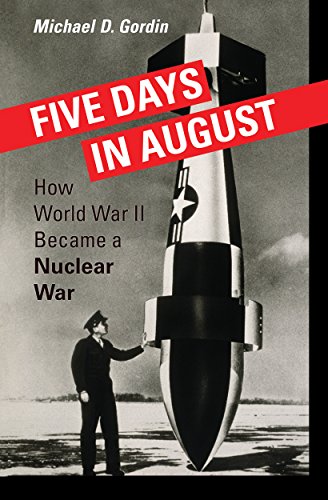Five Days in August: How World War II Became a Nuclear War
Gordin, Michael D.
About the Book
Description:
Former library book; Missing dust jacket; Pages can have notes/highlighting. Spine may show signs of wear. ~ ThriftBooks: Read More, Spend Less 1. Seller Inventory # G0691128189I3N11
About this title:
Synopsis:
Most Americans believe that the Second World War ended because the two atomic bombs dropped on Japan forced it to surrender. Five Days in August boldly presents a different interpretation: that the military did not clearly understand the atomic bomb's revolutionary strategic potential, that the Allies were almost as stunned by the surrender as the Japanese were by the attack, and that not only had experts planned and fully anticipated the need for a third bomb, they were skeptical about whether the atomic bomb would work at all. With these ideas, Michael Gordin reorients the historical and contemporary conversation about the A-bomb and World War II.
Five Days in August explores these and countless other legacies of the atomic bomb in a glaring new light. Daring and iconoclastic, it will result in far-reaching discussions about the significance of the A-bomb, about World War II, and about the moral issues they have spawned.
From the Back Cover:
"Michael Gordin's Five Days in August is a gripping reconsideration of how the atomic bomb figured in the ending of World War II. Gordin recounts how the bomb came to be viewed soon after the unexpectedly swift surrender as a special, revolutionary weapon, and he ruminates upon the implications of that shift for weapons policy in the postwar world. In all, a remarkable, thought-provoking book."--Daniel Kevles, author of The Physicists: The History of a Scientific Community in Modern America
"With stunning details grounded in a myriad of sources, Gordin captures the ethos of the first nuclear war--how it seemed back in the heat of war, before history revised its estimation of the bomb and made the twin bombings of August 1945 into a unique and self-evidently decisive event. No one can fully understand the end of World War II without taking on board Gordin's study."--Peter Galison, author of Einstein's Clocks, Poincaré's Map
"Bold and provocative. No one has presented these arguments so coherently, so forcefully, and so intelligently with such gripping, dynamic style."--Tsuyoshi Hasegawa, author of Racing the Enemy: Stalin, Truman, and the Surrender of Japan
"Powerful. Five Days in August vigorously proposes new ways of thinking about the World War II atomic bombings, their meanings, and their multiple legacies. It is a book that will provoke controversy and, ideally, help encourage new lines of research, argument, and emphasis. It has a deep critical knowledge and a subtle intelligence. The arguments are arresting and important."--Barton Bernstein, Stanford University
Bibliographic Details
Title: Five Days in August: How World War II Became...
Publisher: Princeton University Press
Publication Date: 2007
Binding: Hardcover
Condition: Good
Dust Jacket Condition: No Jacket
